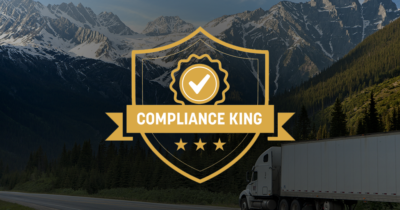Canada First in Fleet Tech: Why Canadian-Owned ELD & Telematics Solutions Matter
Introduction: Canada’s Moment of Reflection Canada’s trucking industry stands at a pivotal crossroads. With Transport Canada's Electronic Logging...
Keep an eye on the road
Simplify your driver's routine
For efficient decision making
Ensure the compliance of your fleet
Simplify the daily life of your drivers
Maximize the value of your data
Unparalleled monitoring of your assets
The friendly competition that pays off
Planning powered by data
Exceed your customers' expectations
Provide better service to your users
Maximize the satisfaction of your citizens
Simplify your daily life on the construction site
Facilitate the electrification of your fleet
Our experts meet your needs
Easily meet the standards
Improve the safety of your drivers
Protect your data and your fleet

In the last few weeks, we’ve heard from concerned clients and prospects that worried about the compliance of Geotab to ELD regulation, specifically related to the Cloud ELD infrastructure and the notion of cellular synchronisation. The concerns stem from an article in Transport Routier magazine’s January/February 2019 edition, as well as scare tactics being spread by some of our competitors in the market. In this article, I’ll go over the FMCSA’s actual comments and clarifications on the subject, and how Geotab complies and addresses potential problems inherent to this architecture.
First, let’s examine the wording in this article in Transport Routier:

We’ll assume they’re referring to the FMCSA as we could not find a reference to an FMSA. Although no source is cited, this makes it look as though the FMCSA would have stated that any driver using Cloud ELD outside cell coverage is illegal. Our extensive research yields no such comment. In fact, the beginning of this “quote” seems to come from an excerpt of a town hall meeting to issue clarifications on the ELD mandate held by the FMCSA on May 9th, 2017. You can see the official minutes of this meeting here although the answer to this important question is not detailed in the minutes. The full audio recording is available here, the question is asked and answered around the 1:08:35 mark. Just for the sake of ease of access, here’s a clipped version of the audio for just this question and its answer. What we’re hearing from that is:
1. Clients should understand how their ELD system works and make informed decisions based on their needs;
2. Providers (like Geotab) should take care of ensuring the Record Of Duty Status (RODS) is always available on the driver’s device, whether in or out of coverage;
3. The FMCSA does not favor one method over another.
To conclude their detailed answer on the subject, here’s the specific example given by the FMCSA of something that might go wrong in this architecture:
But once again, that driver’s Record Of Duty Status has to remain current, you know if the device goes through a power cycle and it cannot populate the driver’s hours-of-service once it powers back up, then that might not be the best system for that type of operations. It’s not prohibited, that’s something to take into consideration.
There’s several things Geotab has done in their implementation to address all kinds of scenarios and make sure all bases are covered. The example above simply does not apply to the solution we have in place. Geotab Drive constantly syncs and caches logs between the device and the cloud, and in the event cell coverage is interrupted, even if the device is power cycled, a driver will still be able to return to the application, load up his compliance print and show his Record Of Duty Status to an agent in case of a roadside inspection. They can do so in compliance with the ELD mandate.
Geotab has worked with the FMCSA for years in the design and implementation of their ELD solution, and continues to do so in an ongoing dialog, as the FMCSA continues to allow exemptions and amendments. While Geotab has 1.3 million connected vehicles worldwide, about 450 000 of them operate under ELD regulation. Unlike some competitors, Geotab does not operate grandfathered AOBRD devices, which means all of those hundreds of thousands of devices operate in ELD mode, in full compliance with the mandate. AttriX supports roughly 8 000 of these on ELD and Canadian regulations. In the past 18 months of the mandate being in effect, our clients have signified exactly 0 instances of tickets related to Operating Without Logs because of a lack of cellular coverage. We have helped drivers get through countless roadside inspections in confidence, and have helped clients through DOT audits with congratulations from inspecting officers and comments on how Geotab is much more compliant than any other solutions they had seen.
The ELD mandate might look simple at a glance, but it takes a serious solution provider to implement, support and stand by their implementation. While we do recommend you take care in choosing your ELD solution provider, we feel very confident in the compliance of the AttriX and Geotab product offering for ELD and e-logs across North America. Our processes are thorough and our engineering on point. We also believe in selling our products and services on features and support rather than resorting to scare tactics, but that’s just the way we are. If you have any questions regarding our products, services, architecture or compliance, feel free to reach out.
Additional resources regarding Geotab’s Cloud ELD infrastructure are available here. Recent changes in update 1901 also address edge cases for prolonged out-of-coverage events, detailed here.
Louis-Philippe Papillon, VP Technologies

Introduction: Canada’s Moment of Reflection Canada’s trucking industry stands at a pivotal crossroads. With Transport Canada's Electronic Logging...

The highly anticipated Geotab Connect 2025 opened its doors yesterday with a record attendance of over 4,000 participants from around the world,...

For a long time, companies have primarily relied on experience, intuition, and impressions. While these methods have certainly proven effective over...